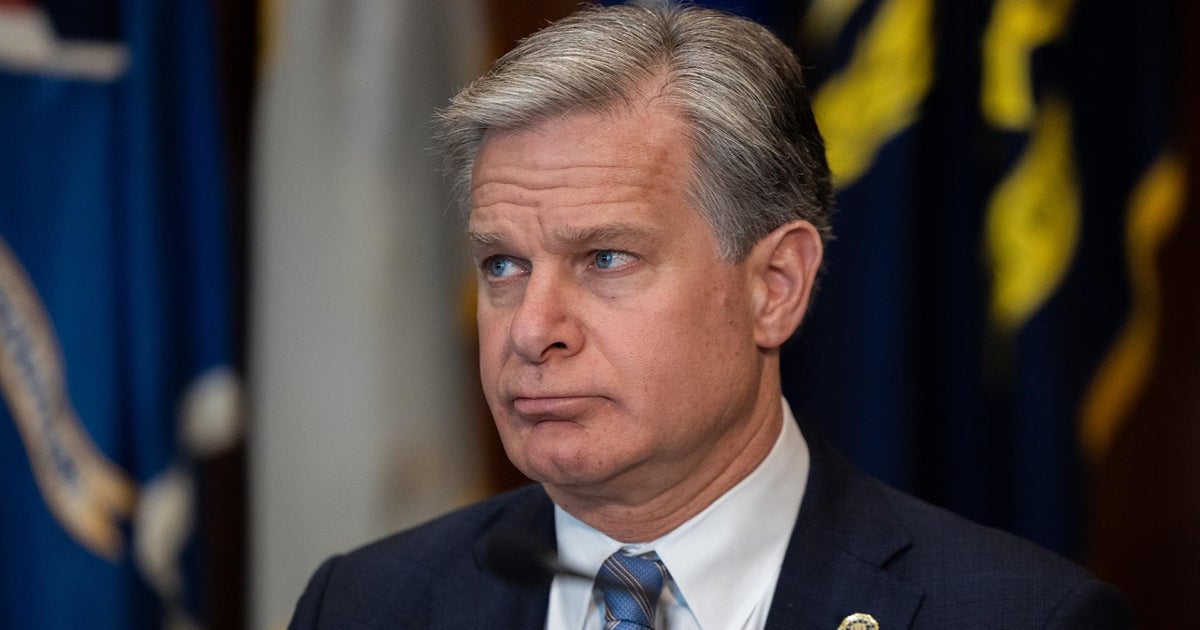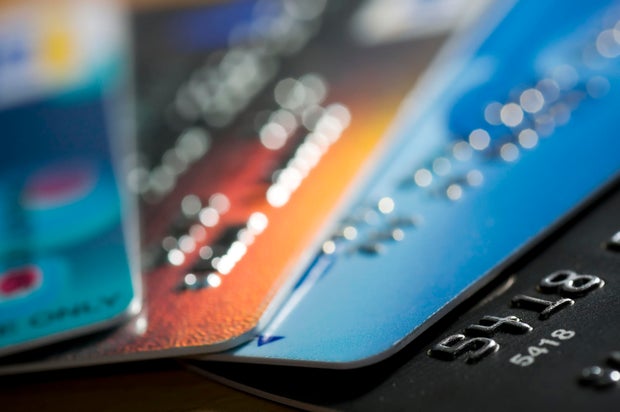CBS News
Trump in Paris for reopening of Notre Dame Cathedral, will meet with Macron, Prince William

President-elect Donald Trump is off on his first international trip since he was re-elected to the White House. He will join world leaders and dignitaries in Paris to celebrate the renovation and reopening of Notre Dame Cathedral five years after a devastating fire destroyed the landmark.
Earlier this week, Trump said he had accepted an invitation from French President Emmanuel Macron. He said Macron had done “a wonderful job ensuring that Notre Dame has been restored to its full level of glory, and even more so. It will be a very special day for all!”
Louise Delmotte / AP
Trump touched down at Paris’ Orly Airport on Saturday morning. More than 20 French government security agents helped ensure his safety alongside the Secret Service, according to French national police. Security is tighter than usual outside the U.S. Embassy and other sites around Paris for the grandiose reopening.
Notre Dame was damaged in a fire that raged for 12 hours on April 15, 2019, nearly destroying the iconic 1,200-year-old church. Although experts said at the time that the restoration could take up to 40 years, Macron vowed to rebuild in five years.
“The decision to rebuild Notre Dame was about our capacity to save, restore, sometimes reinvent what we are by preserving where we come from,” Macron told 60 Minutes. “This is a message of achievement.”
Macron, who has had an up-and-down relationship with Trump, has made a point of cultivating a relationship with the president-elect since he defeated Vice President Kamala Harris last month. But his office nonetheless played down the significance of the invitation, saying that other politicians who do not currently hold office had been invited as well.
President Joe Biden was invited as well but will not attend. White House press secretary Karine Jean-Pierre cited a scheduling conflict and said that the first lady, Jill Biden, will instead represent the U.S.
Trump and the U.S. first lady last encountered one another shortly after the election, when he visited the White House for the traditional meeting between outgoing and incoming presidents.
Trump’s visit to France comes as Macron and other European leaders are trying to cultivate the president-elect’s favor and persuade him to maintain support for Ukraine in its defense against Russia’s three-year invasion.
Ahead of the Notre Dame event, Trump will meet with Macron and Britain’s Prince William — who’s also meeting with Jill Biden, according to the British royal palace.
Macron will convene separately on Saturday with Ukrainian President Volodymyr Zelenskyy. It’s not clear whether Trump will meet Zelenskyy, too. Trump has vowed to end the war in Ukraine swiftly but has not specified how, raising concerns in Kyiv about what terms may be laid out for any future negotiations.
In an effort to build trust with the incoming U.S. administration, Zelenskyy’s top aide Andriy Yermak met key members of Trump’s team on a two-day trip earlier this week. A senior Ukrainian official, who spoke on condition of anonymity as he was not authorized to speak publicly, described the meetings as productive but declined to disclose details.
Relations between France and the U.S. during Trump’s first term began warmly enough but grew increasingly strained over time.
Macron was the guest of honor at Trump’s first state dinner, and Trump traveled to France several times. But the relationship suffered after Macron criticized Trump for questioning the need for NATO and raising doubts about America’s commitment to the mutual defense pact.
On the campaign trail this year, Trump often mocked Macron, imitating his accent and threatening to impose steep tariffs on wine and champagne bottles shipped to the U.S. if France tried to tax American companies.
But Macron was one of the first global leaders to congratulate Trump last month after the election.
Last weekend, Trump announced that he intends to nominate real estate developer Charles Kushner, the father of his son-in-law, Jared Kushner, to serve as ambassador to France. Predecessors in that prestigious role include Benjamin Franklin and Thomas Jefferson.
CBS News
Trying to settle your credit card debt? Watch these 4 red flags

Getty Images
Several years of high inflation are still straining the budgets of millions of Americans. Despite recent cooling, essential living costs like food, gas and housing remain elevated. Many pinched consumers are turning to their credit cards to make ends meet.
Consequently, many are becoming more reliant on credit cards, with an average credit balance of around $8,000. With credit card interest rates averaging 23.37% and exceeding 30% on some retail cards, the cost of carrying a balance can create an untenable situation for many.
Credit card repayment strategies, debt consolidation and balance transfer cards offer practical ways to manage your debt. Non-profit credit counseling agencies can also be invaluable tools to help you regain control of your finances.
Debt settlement programs may make sense for those on the verge of bankruptcy as they help reduce the overall amount of debt you owe to creditors. While many reputable debt settlement companies can provide debt relief, it’s essential to identify the red flags to avoid the untrustworthy ones. Below, we’ll detail four to know.
Start tackling your credit card debt here now.
4 red flags to avoid when trying to settle your credit card debt
Having high-rate credit card debt can be stressful. Don’t add to it by missing these four debt relief red flags:
Servicers charge upfront fees
Perhaps the most obvious sign a debt settlement company isn’t legitimate is they require you to pay a fee to settle your debts. Federal law prohibits debt settlement companies from collecting fees before settling a debt, and the Consumer Financial Protection Bureau (CFPB) has filed lawsuits against companies that violate this practice.
Alex Beene, a financial literacy instructor at the University of Tennessee at Martin, notes,”Typically, any entity charging an upfront fee does so in order to lock in what they can get from the customer as quickly as possible and out of an understanding they may not be able to resolve the debt issues of the customer. Don’t do it.”
Explore your legitimate debt relief alternatives here now.
Servicers don’t provide a written agreement
If a company doesn’t provide a written agreement breaking down the services they’ll provide and what you can expect, they’re probably not legitimate. Reputable companies are transparent and typically have a process to help reduce your debts.
“Avoid companies that do not provide clear, written information about fees, timelines or risks associated with their services,” says Melissa A. Caro, a certified financial planner and financial literacy advocate. “Anyone who is vague or tries to apply pressure should be considered suspect. Legitimate services will provide all the necessary information upfront.”
Servicers make lofty guarantees
The CFPB recommends avoiding any company that makes grand promises and guarantees, such as:
- Eliminating all of your debt
- Making debt collectors go away
- Reducing all of your debt for a fraction of what you owe
The reality is that debt settlement isn’t a one-size-fits-all process. While a company can make every effort to negotiate with your creditors, they can’t guarantee how a creditor or debt collector will respond. Any company that guarantees results is likely misleading you. By contrast, legitimate debt settlement firms will be upfront about the risks involved and won’t make promises they can’t keep.
Servicers contact you unsolicited
Be wary of debt settlement companies that contact you unsolicited, especially through robocalls. There’s a high probability companies relying on these aggressive tactics aren’t legitimate. Too commonly, these scams prioritize high-pressure sales over a genuine focus to improve your financial well-being.
“One of the best tools a scammer has is fear,” says certified financial planner Chris Cybulski at Chisholm Trail Financial Group. “If you’re in debt and getting calls from creditors, you may not be in a great space mentally. When someone calls they can use fear to get you to act quickly or irrationally. Urgency is also a tool used by scammers. When you have to act now or this deal will fall apart, ask yourself if what they are promising is real.”
The bottom line
Dealing with crippling credit card debt can be stressful and it’s easy to fall for offers that sound too good to be true. Scammers know this and try to take advantage of unsuspecting debtors by making big promises they can’t keep and charging high fees for negligible — if any — results. Learning to spot the warning signs can help you avoid being scammed and find honest companies that actively work to help you get your debt under control.
CBS News
Ontario premier says Canada could cut U.S. energy supplies in retaliation for Trump tariffs

The premier of Canada’s most populous province on Wednesday threatened to cut off energy supplies to the U.S. if President-elect Donald Trump implements his proposed tariffs on Canadian goods. This bold move highlights the escalating tensions between the two nations as they grapple with potential trade conflicts.
“We will go to the full extent depending how far this goes. We will go to the extent of cutting off their energy, going down to Michigan, going down to New York State and over to Wisconsin,” Ontario Premier Doug Ford said during a press conference following a virtual meeting with Canadian Prime Minister Justin Trudeau and other provincial premiers to discuss Trump’s tariff threat. “I don’t want this to happen, but my No. 1 job is to protect Ontario, Ontarians and Canadians as a whole since we’re the largest province.”
Trump in November threatened to impose a blanket 25% tariff on all products from Canada and Mexico unless the two countries take action to curb the flow of drugs and unauthorized migrants to the U.S.
The Canadian government said it was considering spending the equivalent of more than $700 million to better protect the border. In a bid to avert new U.S. tariffs, the plan would increase the number of officers and buy additional equipment, such as helicopters and drones, to tighten border crossings.
Ford said his province, Canada’s federal minister of finance and other provinces will put together a list of items on which the country could impose retaliatory tariffs against the U.S.
“We need to be ready to fight. This fight is 100% coming on Jan. 20 or Jan. 21,” he said to reporters, referencing Trump’s inauguration date, “and we don’t know to what extent this fight is going to go.”
Both Canada and U.S. would lose
Analysts warn that dueling tariffs would harm both the U.S. and Canadian economies. Canada provides natural gas to the U.S. and roughly 20% of the crude oil used by its southern neighbor. Patrick De Haan, head of petroleum analysis at GasBuddy, has forecast that U.S. gas prices could jump 30 to 40 cents a gallon, and potentially up to 70 cents, shortly after Trump’s tariffs took effect.
Midwestern states in particular could face serious risks if Trump’s plan for tariffs on Canada, Mexico and China goes into effect.
Michigan and Illinois rely heavily on imports from Canada, Mexico, and China, which account for 19% and 12% of their state GDPs, respectively, according to analysts at Fitch Ratings Group. Michigan, which produces nearly 19% of vehicles sold in the U.S., particularly depends on cross-border trade. Meanwhile, Illinois, home to the fourth-largest crude oil refinery in the country, sources most of its crude oil from Canada.
“If enacted precisely as proposed, the broad tariffs proposed by President-elect Trump could pose a notable economic shock with tariff rates rising to levels not seen in the U.S. since the Great Depression,” according to a recent analysis by Fitch.
Experts also warn that stiff U.S. tariffs would likely push the Canadian economy into a recession in 2025, causing a spike in inflation and forcing the Bank of Canada to pause interest rate cuts next year. According to a recent report from Michael Davenport, an economist with Oxford Economics, Canada’s energy, auto and heavy manufacturing sectors would be hit hardest because of the high degree of cross-border trade in these industries.
“25% U.S. tariffs along with proportional retaliatory tariffs would reduce Canada’s exports and cause its GDP to fall 2.5% peak-to-trough by early-2026. Inflation would surge to 7.2% by mid-2025, and 150,000 layoffs would lift the unemployment rate to 7.9% by year-end,” Davenport said.
During his first term in office, Trump imposed tariff on Canadian steel and aluminum exports. Canada retaliated with its own duties on U.S products such as whiskey and yogurt coming from a plant in Wisconsin.
CBS News
AI company says its chatbots will change interactions with teen users after lawsuits

Character.AI, the artificial intelligence company that has been the subject of two lawsuits alleging its chatbots inappropriately interacted with underage users, said teenagers will now have a different experience than adults when using the platform.
Character.AI users can create original chatbots or interact with existing bots. The bots, powered by large language models (LLMs), can send lifelike messages and engage in text conversations with users.
One lawsuit, filed in October, alleges that a 14-year-old boy died by suicide after engaging in a monthslong virtual emotional and sexual relationship with a Character.AI chatbot named “Dany.” Megan Garcia told “CBS Mornings” that her son, Sewell Setzer, III, was an honor student and athlete, but began to withdraw socially and stopped playing sports as he spent more time online, speaking to multiple bots but especially fixating on “Dany.”
“He thought by ending his life here, he would be able to go into a virtual reality or ‘her world’ as he calls it, her reality, if he left his reality with his family here,” Garcia said.
The second lawsuit, filed by two Texas families this month, said that Character.AI chatbots are “a clear and present danger” to young people and are “actively promoting violence.” According to the lawsuit, a chatbot told a 17-year-old that murdering his parents was a “reasonable response” to screen time limits. The plaintiffs said they wanted a judge to order the platform shut down until the alleged dangers are addressed, CBS News partner BBC News reported Wednesday.
On Thursday, Character.AI announced new safety features “designed especially with teens in mind” and said it is collaborating with teen online safety experts to design and update features. Character.AI did not immediately respond to an inquiry about how user ages will be verified.
The safety features include modifications to the site’s LLM and improvements to detection and intervention systems, the site said in a news release Thursday. Teen users will now interact with a separate LLM, and the site hopes to “guide the model away from certain responses or interactions, reducing the likelihood of users encountering, or prompting the model to return, sensitive or suggestive content,” Character.AI said. Adult users will use a separate LLM.
“This suite of changes results in a different experience for teens from what is available to adults – with specific safety features that place more conservative limits on responses from the model, particularly when it comes to romantic content,” it said.
Character.AI said that often, negative responses from a chatbot are caused by users prompting it “to try to elicit that kind of response.” To limit those negative responses, the site is adjusting its user input tools, and will end the conversations of users who submit content that violates the site’s terms of service and community guidelines. If the site detects “language referencing suicide or self-harm,” it will share information directing users to the National Suicide Prevention Lifeline in a pop-up. The way bots respond to negative content will also be altered for teen users, Character.AI said.
Other new features include parental controls, which are set to be launched in the first quarter of 2025. It will be the first time the site has had parental controls, Character.AI said, and plans to “continue evolving these controls to provide parents with additional tools.”
Users will also receive a notification after an hour-long session on the platform. Adult users will be able to customize their “time spent” notifications, Character.AI said, but users under 18 will have less control over them. The site will also display “prominent disclaimers” reminding users that the chatbot characters are not real. Disclaimers already exist on every chat, Character.AI said.












